Truman Statue Unveiling and Dedication Transcript | October 3, 2022
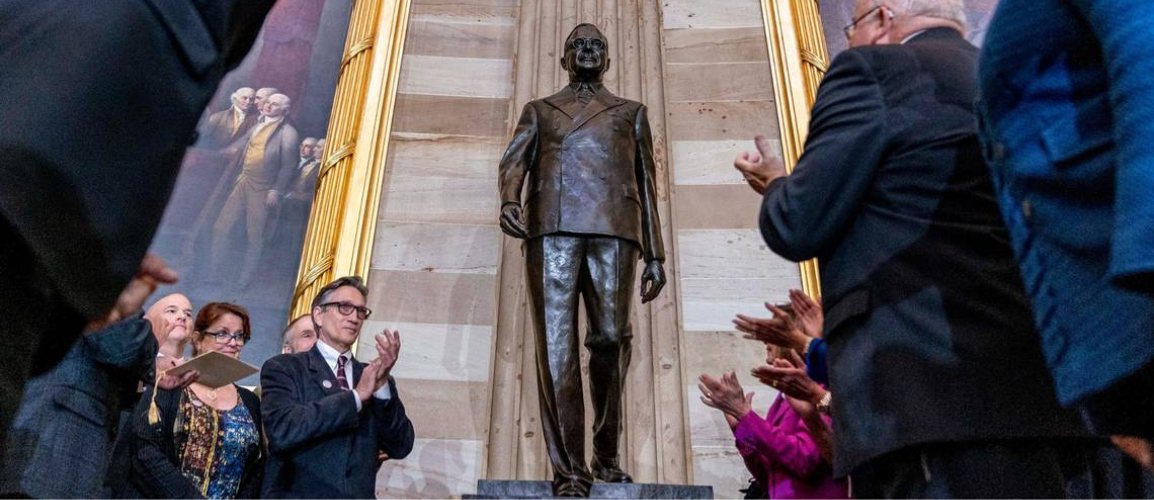
On September 29, 2022, The Honorable Nancy Pelosi presided over the unveiling and dedication of the Truman Statue in the U.S. Capitol Rotunda. The transcript of the national dedicatory event follows.
THE HONORABLE NANCY PELOSI
As Speaker of the House, it is my privilege to welcome you to the United States Capitol, as we celebrate one of our nation’s finest presidents, President Harry Truman. It is only fitting that this son of Independence, Missouri, takes his rightful place here in the Rotunda of our Temple of Democracy in the United States Capitol. Now at this time, please rise as you are able for the Presentation of Colors and for the National Anthem. [Pause] [Music] [Pause]
ANNOUNCER
Ladies and gentlemen, please remain standing for the invocation delivered by Senate Chaplain, Dr. Barry Black.
SENATE CHAPLAIN DR. BARRY BLACK
Let us pray. Eternal God, Creator of great lives, we praise you for this statue dedication that honors the laudable life of Harry S. Truman, the 33rd President of the United States. Lord, we are grateful for his numerous contributions that helped protect and defend the Constitution of the United States against all enemies. We celebrate that he helped our nation navigate through World War II. We’re thankful for the Truman Doctrine, the Berlin Airlift, the creation of the United Nations, and the end of racial segregation in the United States Armed Forces that occurred during his presidency. Lord, you brought him from humble beginnings and used even his setbacks to provide him with stepping stones to greater usefulness. Inspired by his notable life, give us the wisdom to permit our reach, to exceed our grasp for courage, creativity, and commitment. We pray in your sovereign name, amen.
ANNOUNCER
Ladies and gentlemen, please take you seats. Ladies and gentlemen, the Honorable Nancy Pelosi, Speaker of the United States House of Representatives.
THE HONORABLE NANCY PELOSI
Now this is what you all came for. Now it’s my special honor to invite forward President Truman’s grandsons: Clifton Truman Daniel and his wife, Polly, and Thomas Washington Daniel. Alex Burden and Dr. Kirk Graham of the Truman Library Institute, Members of the Missouri Congressional Delegation both House and Senate – and I might add, current and past – and Leaders McCarthy and McConnell. Together, we will unveil the spectacular statue. [Pause] [Applause] [Pause]
ANNOUNCER
Ladies and gentlemen, Mr. Clifton Truman Daniel, Honoree Chairman of the Truman Library Institute and Board Secretary for the Truman Scholarship Fund.
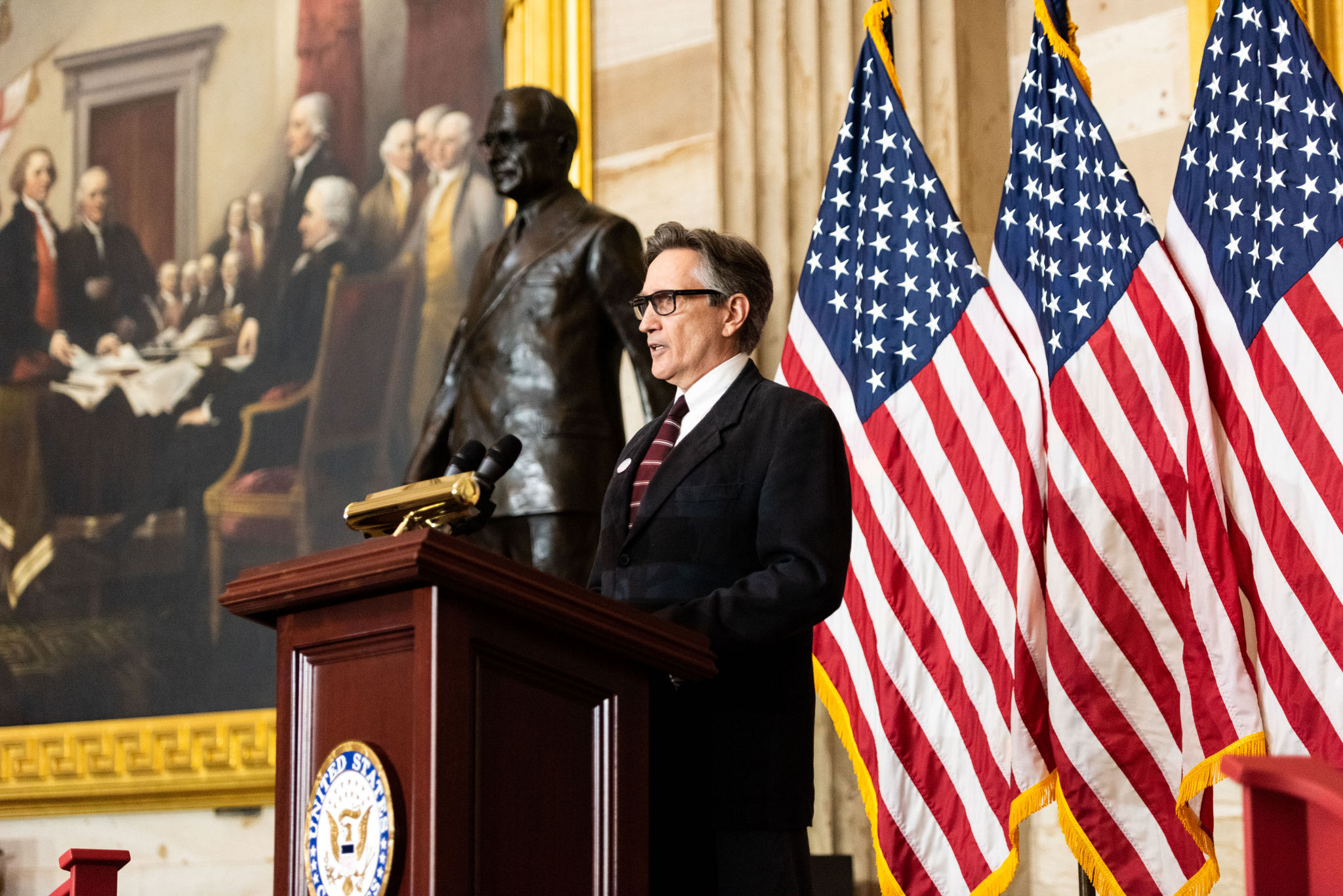
CLIFTON TRUMAN DANIEL
Thank you, Madam Speaker, Senator Blunt, Congressman Cleaver, Leader McConnell, Leader McCarthy, family, friends, and thank you again Senator Blunt and Congressman Cleaver, the Chairman Pat Ottensmeyer, and the Board of the Truman Library Institute, Alex Burden and the Institute’s staff, Dr. Kirk Graham and the library staff, and the generous donors, friends, supporters, lawmakers who helped make this day possible.
My grandfather was a modest man and frankly, slightly embarrassed by statues. His presidential library is an educational institution rather than a monument to him, but were he with us today, he would be honored and humbled. He loved the United States of America, he loved the work of government, he loved this very building. He took the job seriously but never himself. He was open and approachable as Tom Corbin’s excellent statue depicts. He has been called an uncommon common man. Of all his accomplishments, the Marshall Plan, NATO, the Truman Doctrine, the desegregation of the Armed Services, I think the most significant was reminding us that a farmer, a citizen soldier, a small business man can rise to the highest office in this land and do a better job of it than almost anybody else.
That is the promise of this nation, the nation that that same ability lives within each one of us. He did what he did for the greater good, not the greater glory. He always said that it was amazing how much you can get done if you didn’t care who got the credit. His favorite epitaph in Tombstone, Arizona reads, “Here lies Jack Williams. He done his damnedest.” He was an honest, hardworking, empathetic, and sensible human being and I leave you today with my family’s deep gratitude and a quote that illustrates those qualities in my grandfather, “Do your duty and history will do you justice.” Thank you. [Applause]
ANNOUNCER
Ladies and gentlemen, the Honorable Emanuel Cleaver II, Representative from the 5th District of Missouri. [Applause]
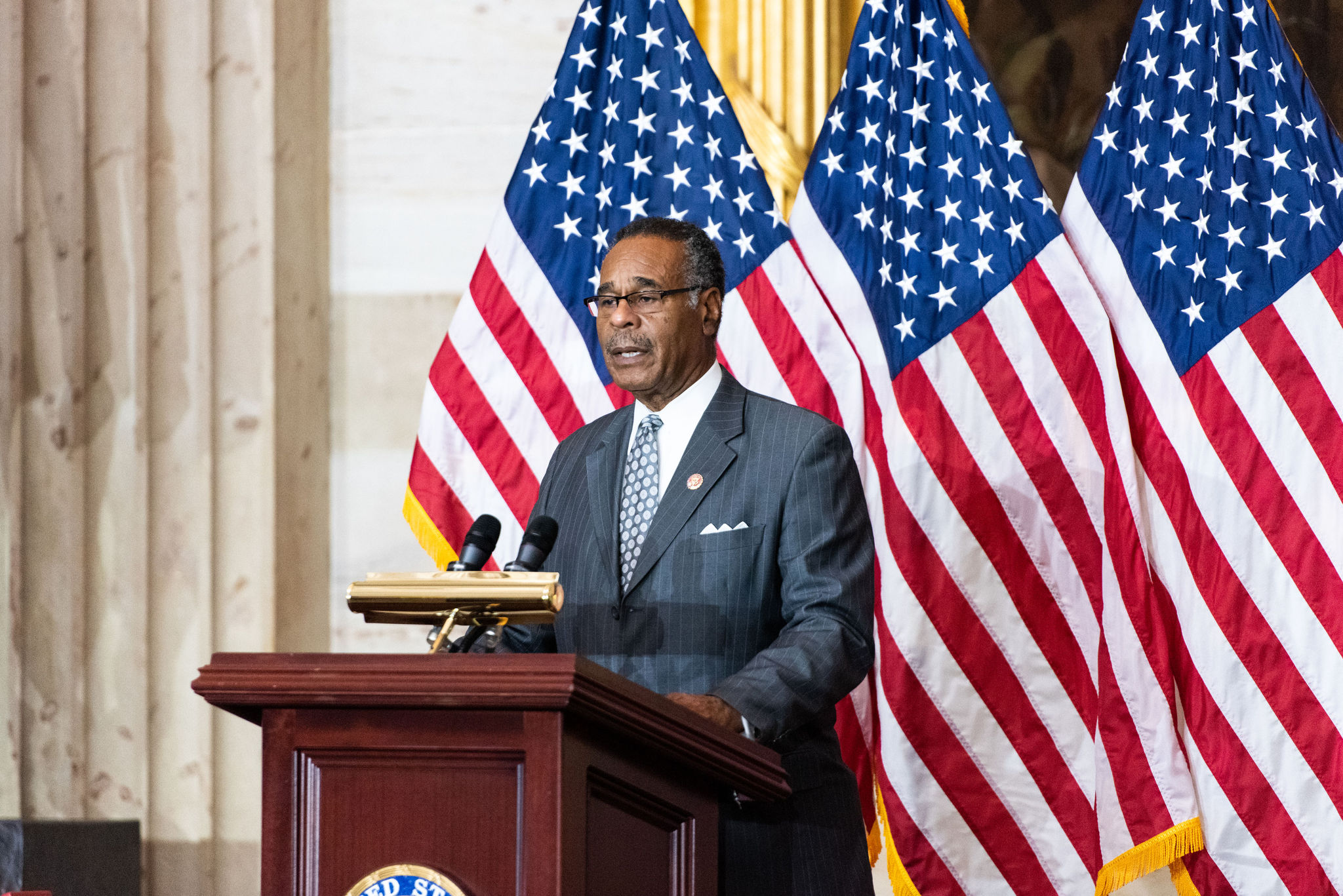
THE HONORABLE EMANUEL CLEAVER II
This statue proves that government can work and work quickly. This only took us 20 years. [Laughter] It is an honor to join you today as we gather to commemorate the return of the man from Missouri to the United States Capitol, with the unveiling and congressional dedication to President Harry Truman. I think that Truman’s hometown of Independence, Missouri is probably floating around above the ground with pride. I want to start by thanking the sculptor, Tom Corbin, the Truman Library Institute, Ted Farnen, and my colleague, friend, and neighbor, Russ Carnahan, without whose help, this would not have been possible.
Born and raised in Missouri, Harry Truman was a man of remarkable character and a shining example of what it means to live the American dream. From a small farm in the heartland, to the pinnacle of power in the United States Senate, Truman demonstrated that through hard work, determination, and perseverance, anyone can overcome the odds and change the world for the better. Throughout his life journey, Harry Truman wore many hats from family farmer, to captain in the US Army during World War I, haberdasher, to county judge, Senator to Vice President, and ultimately President of the United States.
With an innate sense of public service, Captain Harry Truman left his farm to serve his country in World War I. He was one of many young men who answered the call to defend freedom abroad in the great war. Upon returning home, he continued his public service by launching a career in politics, and after some time was elected to the United States Senate. There, he took important strides to cut down on government waste and corruption, raising his popularity with the public and helping make him the selection as President Roosevelt’s running mate in 1944. While he wasn’t looking to climb the ladder of success quickly, 82 days into his vice presidency, he got the call to step up when President Roosevelt died, and he was determined to meet the mercurial moment.
President Truman once said, “Progress occurs when courageous, skillful leaders seize the opportunity to change things for the better,” and that he did. During his presidency, he embodied those words as he faced many challenges and difficult decisions that he navigated with principal and with his purposeful personality. I, personally, want to praise President Truman for being the first president to deliver a speech at the National Association of the Advancement of Colored People on June 29, 1947 at their annual convention. The following year, he helped America take another step towards fulfilling our promise of freedom and equality for all by enacting Executive Order 9980, which desegregated the federal workforce and the military. With these necessary steps, President Truman helped create a Black middle class that enabled African-Americans to advance in society and participate in the prosperity of this great nation.
From ending World War II to forming the United Nations and NATO, to charting a course for civil rights by desegregating the Armed Services and federal workforce, every measurement upon which presidents are scrutinized, Truman is plausibly one of our nation’s greatest leaders. President Truman insisted on being his most authentic self, refused to curry favor to those who chose to approach progress with a caution, and crafted an indelible legacy of challenging the status quo and of assuming devoted leadership.
I can think of no greater person to represent the State of Missouri and the citadel of democracy where he may continue inspire the countless visitors who are hosted each year here in the Capitol. From this day forward, may Harry Truman’s statue serve as a reminder of his courage, and courage we need to have to take on the projects that will help build this nation. For my congressional colleagues and I, we too should accept the responsibility as Truman had declared, “The buck stops here.” Truman leaves a long and lofted shadow cast by his lionhearted leadership upon us and every yet born American.
President Truman, I don’t know how the [Unintelligible] operates, but if you can hear me and if there are antagonists even in Zion, give them hell, Harry. [Laughter] [Applause]
ANNOUNCER
Ladies and gentlemen, the Honorable Roy Blunt, United States Senator from Missouri.
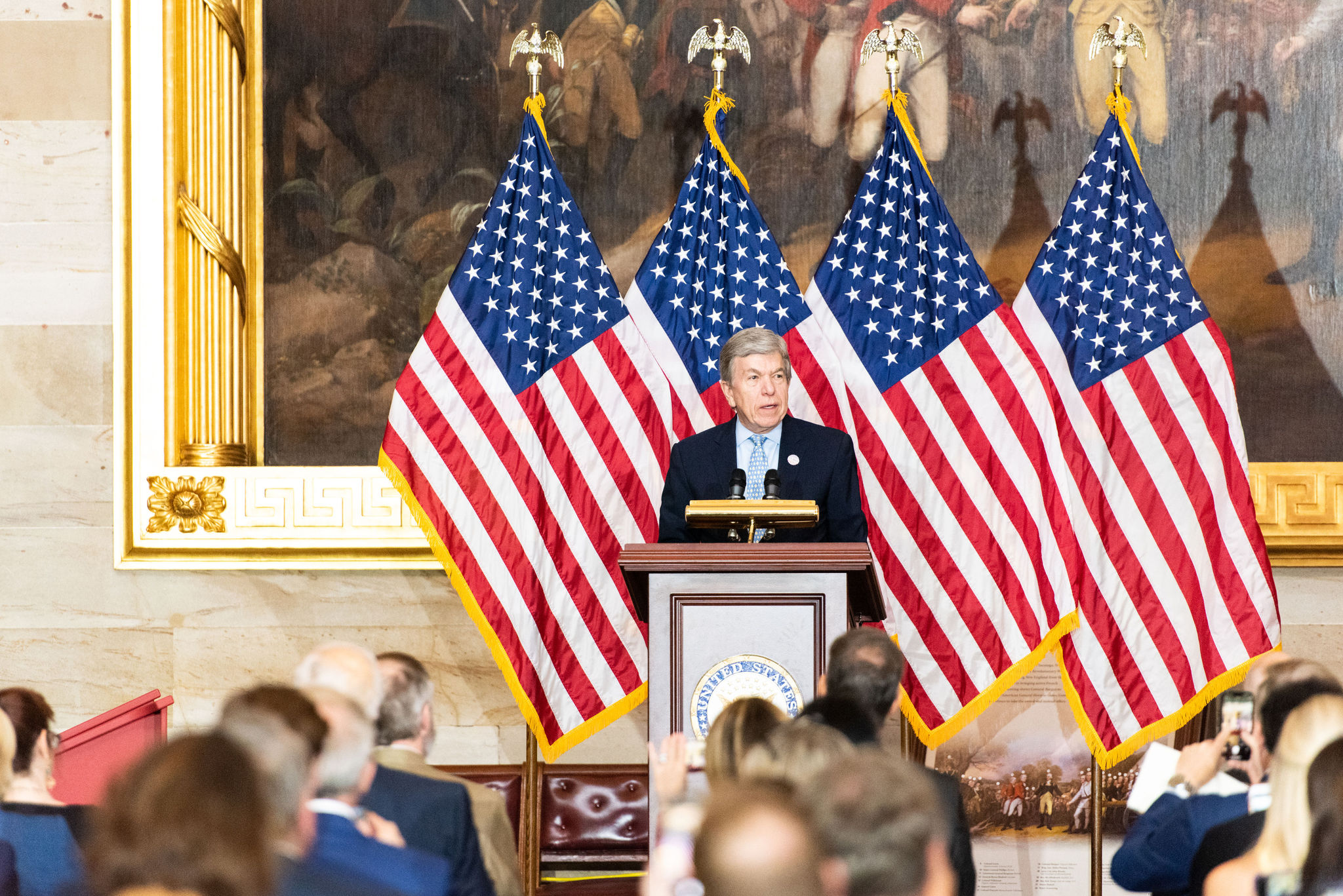
THE HONORABLE ROY BLUNT
Well, on April 12th, 1945, Harry Truman had come over to this building. As Clifton mentioned, he loved the Capitol. He loved working in the Senate. He’d come to this building and not too far from here, in a room that the Speaker still probably calls the Board of Education, he and Sam Rayburn were going over the events of the day and whatever else they might want to talk about that day. A note was passed then to the Vice President, “You need to come to the White House. Something has happened.” Well, there were lots of things happening in April of 1945. It’s hard to know what Harry Truman might have been thinking about when he went to the White House. Later that day, for history since his mother would have already found this out, he wrote his mother a letter before he went to bed that night, and in the letter, he said, “Today, I went to the White House thinking I was going to see the president. I got there and found out I was the president.”
No president, in such a short period of time, made more consequential decisions than Harry Truman: ending the war in Europe, how to deal with the Soviets, how to look at transitioning back to a peacetime economy, what to do about ending the war in Japan, the United Nations, and that’s just the first six months. All the things that Clifton Truman Daniel mentioned that would be on that list of great accomplishments by Harry Truman were important, but if you’ve ever been in a job where you’ve made decisions, just imagine the decisions he had to make and how quickly he had to make them and how well he made them.
When Secretary of State Stettinius had his first meeting with new President Truman, he left the meeting and said to somebody right away, “He seems like a man unusually willing to make decisions,” and he understood the importance of making decisions. He did that based on incredible common sense and a great sense of history. Because of his eyesight, Mrs. Truman was the athlete and the baseball player. He was the reader. Clifton’s mother told me one time, she never saw her dad sat down at home when he didn’t have a book, and he understood the history of the country. He respected the history of the country.
For the last 12 years, I’ve had the great opportunity to use the offices he used in the 10 years he was in the Senate and the 82 days he was vice president, and I feel like I’ve benefited from thinking about those decisions he made and how he made them and what he did for the country. It’s great for us today to see him now in the building he loved, in a democracy that he cherished, in a world that he made so much to design and create and make what it is today. [Applause]
ANNOUNCER
Ladies and gentlemen, the US Air Force band, Singing Sergeants. [Music] [Applause] Ladies and gentlemen, the Honorable Kevin McCarthy, Republican Leader of the United States House of Representatives.
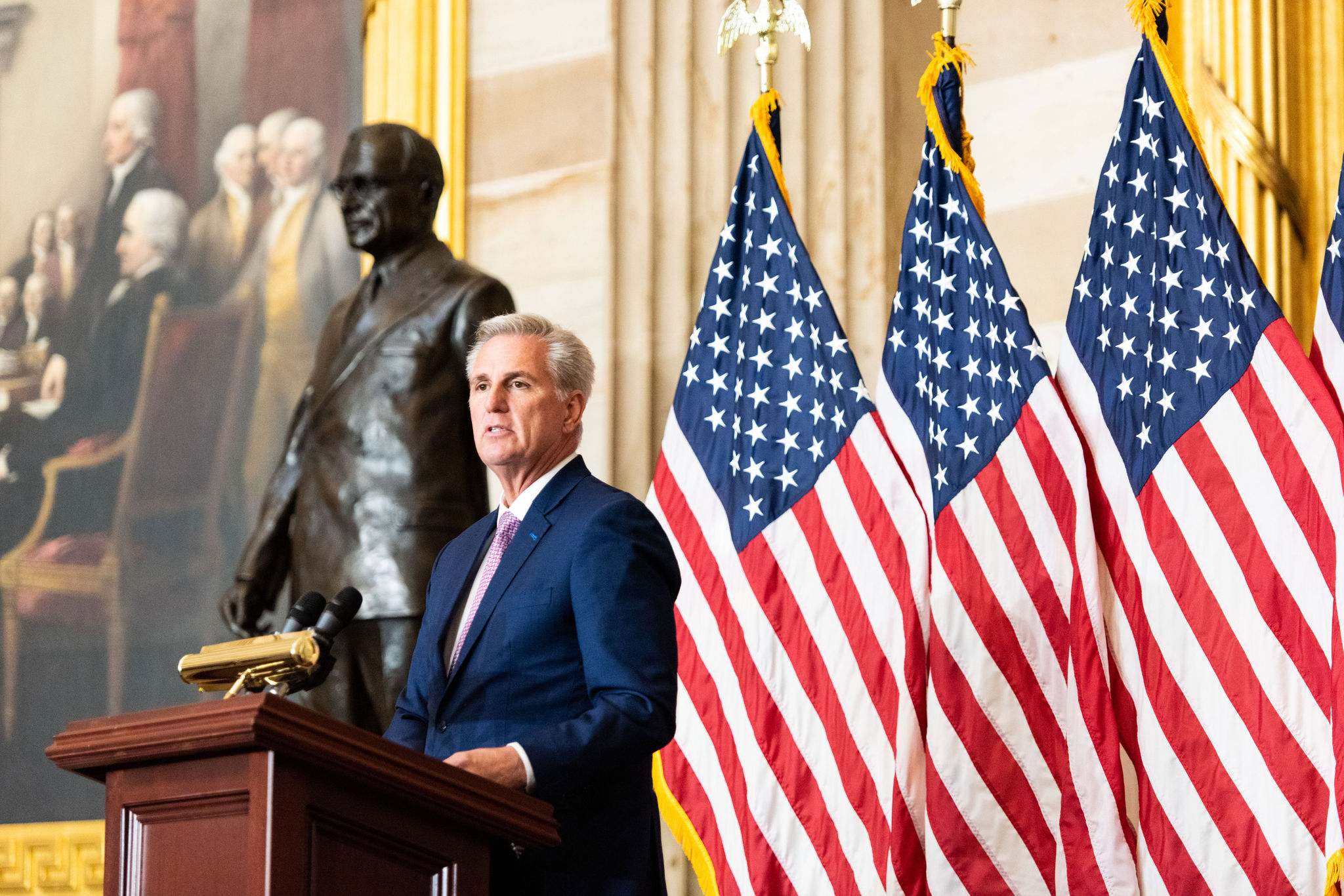
THE HONORABLE KEVIN MCCARTHY
I’m very honored and delighted to welcome this statue of Harry Truman to the Rotunda. It’s at a pivotal moment in our nation’s future. Let’s face it, today’s world is dangerous. Communist China is growing more aggressive, Putin’s Russia is mobilizing and escalating, an Iran regime that murders its own people is inching closer to a nuclear weapon. These dangers echo the chaos, the complexity, and the scope of the early Cold War. As we confront these challenges, we have the lessons of Harry Truman to guide us.
Lesson number one, leadership matters. Truman shaped American foreign policy by taking principled actions based upon the circumstances he faced. In March 1947, he laid out the Truman Doctrine, pledging America would support free peoples against communism. In 1948, he approved the historic Berlin Airlift, which brought the people of Berlin food and medicine, and even candy for more than a year. This forced the Soviets to lift the blockade. Truman trusted Americans’ exceptionalism, and he understood that a successful US foreign policy begins with the idea that we should stand by our principles of freedom.
Harry Truman’s lesson number two, friends and allies matter. In one of his boldest actions as president, President Truman ordered the United States to recognize the State of Israel just 11 minutes after they were created, and Truman remained a steadfast ally to Israel because he knew that the source of our friendship with Israel ran deep. He said in 1952, “Israel has a glorious future before it, not just as another sovereign nation, but as an embodiment of the great ideals of civilization.” This statue reaffirms our unbreakable commitment to Israel and other allies, which are based upon our shared values and interests.
Harry Truman’s lesson number three, live up to our values. Truman knew that the fight for freedom was not restricted to distant lands. One of his shining moments as president was his commitment to challenging civil rights, including in our military. As it was earlier stated, on January 26, 1948, President Truman signed Executive Order 9981, which made segregation in our military illegal. Truman understood the importance of living up to our founding values that we are all created equal, and that is especially true when Americans are fighting together in foxholes.
Lesson number four by Harry Truman is on his statue, the buck stops here. I hope as the policymakers walk through and they admire this statue, they read all the way down to the bottom. That was a sign that Truman famously kept on his desk. It was his motto, his code, his philosophy of leadership. In his farewell address, Truman said, “The President, whoever he is, has to decide. He can’t pass the buck to anybody. No one else can do the deciding for him. That’s his job.”
That’s sound advice not just to a president, but I think to a nation. Everyone should listen to it, especially policymakers. Don’t blame others for your failings. Own them, learn from them, and fix them. Whatever the dangers today, it is important that we learn from history. As we welcome his statue to the Rotunda, Truman’s actions offer lessons for today, tomorrow, and of all time. Let’s remember. Let’s work to build a nation that is safe, a future that is built on freedom, and a government that is accountable. Thank you and God bless. [Applause]
ANNOUNCER
Ladies and gentlemen, the Honorable Mitch McConnell, Republican Leader of the United States Senate. [Applause]
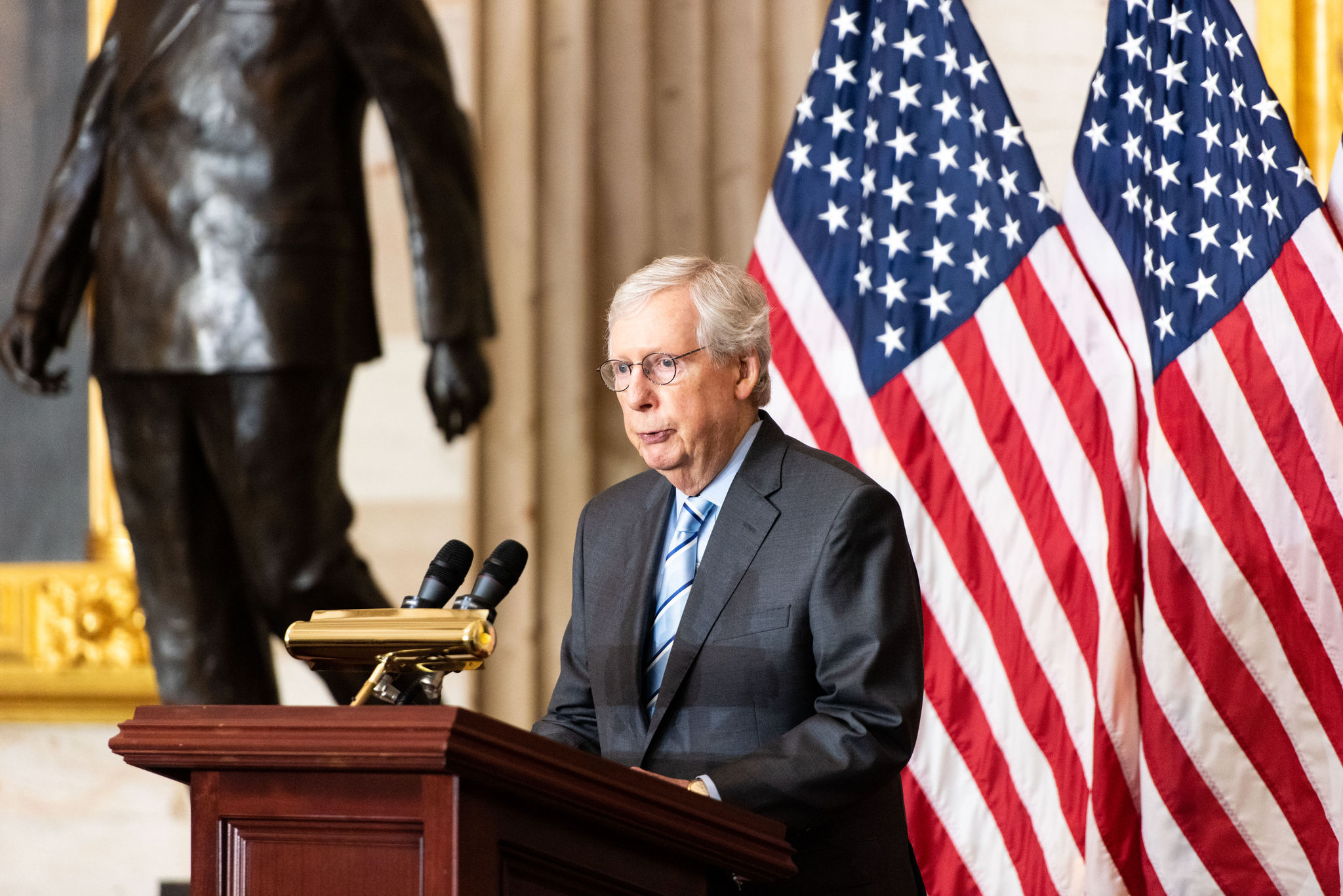
THE HONORABLE MITCH MCCONNELL
When Harry Truman was sworn in as our 33rd President, he’d only held a job of Vice President for 82 days. Overnight, this brand-new number two became our wartime commander-in-chief. He hadn’t even been included in crucial briefings, but now he had to see the fight for victory through to the finish. One of the many times Harry Truman displayed good judgment was when he tapped a Kentuckian, Alben Barkley, to be his running mate in 1948. Senator Barkley was a dependable, principled statesman who was known for his earnestness and dogged work. His fellow Senate Democrats had elected him the leader six times, but now in this role, he got a close-up look at how FDR’s comparatively little-known fourth vice president was acquitting himself in the top job. He later write in his memoirs that Truman was “a professional in the best sense of the word”, that the president “never allowed himself to become so personally exalted that a person could not talk to him as a fellow human being”.
We’re all familiar with a long list of historic events through which President Truman helped lead our country and you’ve heard them, but I’m almost as impressed with the plain spoken, humble Midwestern character that he’s reported to have maintained completely even as he was making all of that history. The man who became the Leader of the Free World overnight, who unleashed unprecedented, literally awesome military power to force murdering tyrants to soothe for peace, and a key early architect of the new international system that would help keep the peace, that person by all accounts remained a citizen and a neighbor first, and from now on, thanks to another son of Kansas City, Tom Corbin, millions of Americans will be able to come face to face with our 33rd President as a human being, right here at the epicenter of the Republic that he ably served [Applause]
ANNOUNCER
Ladies and gentlemen, the Honorable Nancy Pelosi, Speaker of the United States House of Representatives. [Applause]
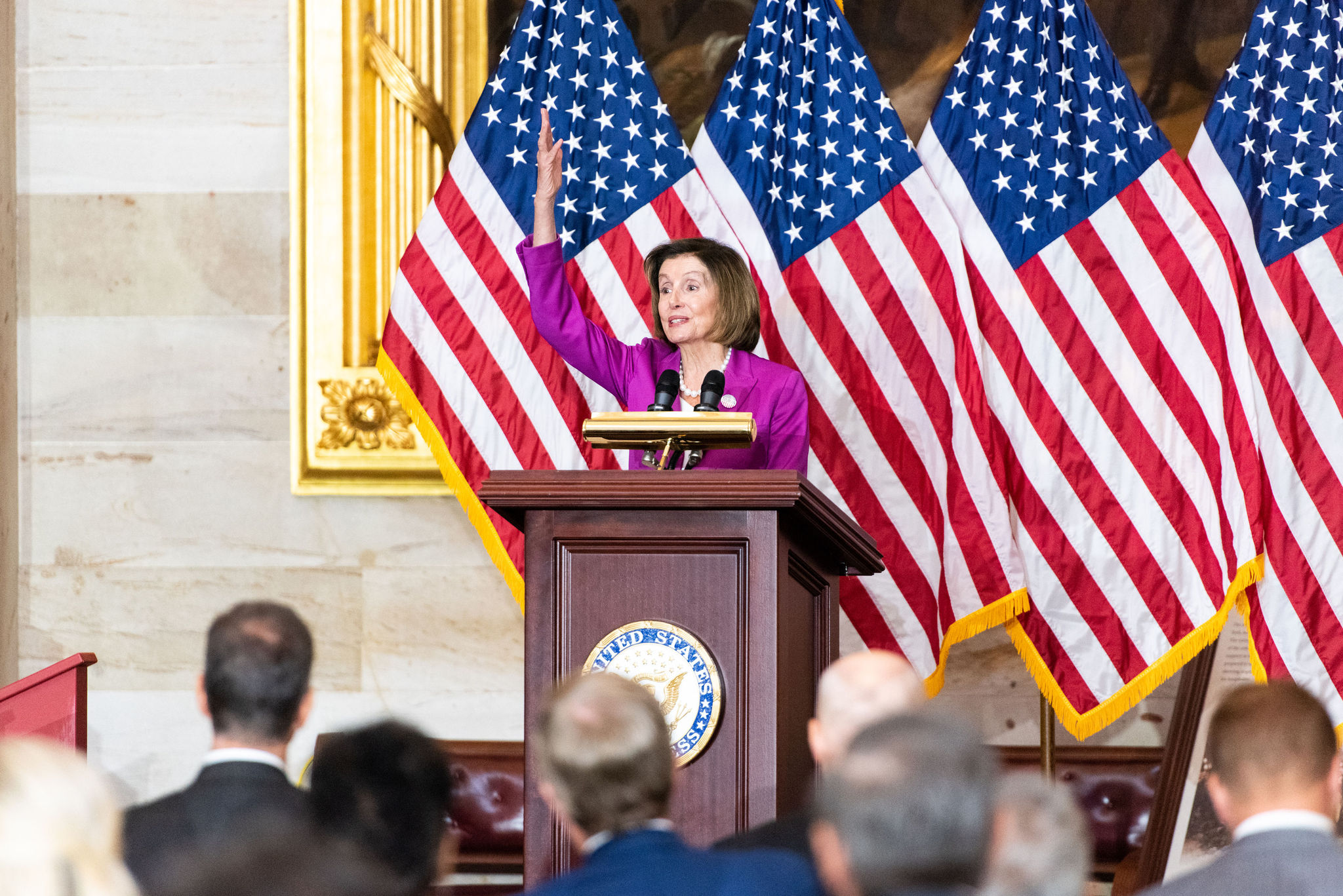
THE HONORABLE NANCY PELOSI
Thank you to our speakers for your beautiful remarks. I associate myself with all of them. I’m not completely sure about Mr. Cleaver’s, but most of them. [Laughter] I just didn’t hear the last sentence, so I want to be precise. Isn’t it wonderful for all of us to be here in the Rotunda, under the Dome, celebrating this great President of the United States? Because, and this is special to us, as Senator Blunt referenced, the President was, as we know, a Member of the United States Senate but we feel very close to him in the House of Representatives.
As the story was told by Senator Blunt, there’s something called the Board of Education room. At the end of the day, Sam Rayburn and some of his colleagues – Steny, you know the story very well – would go to a room, and so they didn’t say, “We’re going to go play cards and have some refreshments.” They said, “We’re going to the Board of Education,” and that was the room in the Capitol, which is a very beautiful place. While the Vice President then was in the room, he received a call from the White House from Eleanor Roosevelt, and that was the call that made all the difference in the world. It was called to the White House, and he would be – as Senator Blunt said, and others – not to see the President, but to become the President of the United States. We feel very close. We still call it the Board of Education. We don’t play cards there, have refreshments anymore, but it is a place of history for us.
Again, what an honor it is to be with the Truman family, who keep alive the noble spirit of our nation’s 33rd President. I thank you, Clifton. Thank you, Thomas. Thank you, Polly. A special thanks to Congressman Russ Carnahan and Senator Jean Carnahan, who worked from day one to help make this occasion possible, and as Mr. Cleaver said, so many people for a long time. Today, we gather to celebrate Harry Truman and the greatest gift he gave to our nation: his unyielding commitment to democracy. It was this fervent belief that drove him to don our nation’s uniform to fight in France during the First World War, to defend the people’s interest for a decade here in these hallowed halls, and to champion freedom and justice here at home and across the world. He brought his Midwest values to the Congress and the White House.
Son of a farmer and himself a small business owner, Truman knew firsthand the promise of the American Dream and the power of democracy to support those aspirations. That’s why, in his 1949 State of the Union address, he pledged that every individual has a right to expect from our government a fair deal, and he made this declaration his mission, putting forth a shining, inclusive vision of prosperity and security for every family. Indeed, President Truman’s moral leadership on civil rights – including historic orders others have mentioned, including the Chaplain, to desegregate the Armed Forces and the federal workforce – forged important progress in the fight for equal justice under the law.
President Truman also deserves great credit for his visionary leadership on healthcare. His impassioned advocacy placed the goal of universal healthcare to the forefront of our national agenda. That is why, when President Johnson – the Medicare bill passed – he travelled to Independence to, in President Truman’s presence, sign the Medicare law and to sign up President Truman as the first Medicare beneficiary. Then seconds later, I said he signed him as a first – a fitting tribute to the leader who honored this truth: healthcare is a right, not a privilege.
I’m going to speak personally for a moment because it’s an honor for me to join in unveiling this statue because I had the privilege of meeting President Truman many years ago. He came to Baltimore to support his friend, my father, with whom he served in the Congress when President Truman was Vice President and President. He came to campaign for my father. We had this wonderful conversation. I was intimidated to meet the President of the United States, but he was very inviting and charming. Clifton and Thomas, he talked about your mother, Margaret. He said, “I’m telling you what I told Margaret. Education. Education. It’s really important. You can never get too much education.” Always a focus on education in that conversation. I didn’t know whether we were going to talk about – I didn’t know what we were going to talk about. I was just in awe of him, but that was his focus in that conversation. He knew the best investment we could make as a nation was in our children’s education because that is how we ensure that all can participate and thrive in our democracy, and this promise is furthered today by the Truman Scholar Initiative, which supports students interested in public service.
Indeed, President Truman’s commitment to democracy did not cease at the water’s edge. He knew that a threat to democracy anywhere was a threat to democracy everywhere. That’s why he worked to rebuild Europe into a bulwark against totalitarianism. That’s why he extended America’s helping hand, including with the Berlin Airlift. That’s why he forged strong alliances with friends of freedom across the globe, especially with the formation of NATO, as has been referenced. This alliance has not only endured, but is stronger today than ever. We continue to look to his leadership for guidance today as we defend democracy against autocracy, especially in Ukraine. Upon signing the North Atlantic Treaty, President Truman offered an inspiring vision, “We believe that it’s possible for nations to achieve unity on the great principles of human freedom and justice,” he said.
May this magnificent statue – and doesn’t it just look like him? You’re all too young, but he had a reputation for walking – going for a walk and the press would follow him, so we see that the statue is President Truman walking. May this magnificent statue, which will stand here at the heart of the Capitol, serve as a constant symbol of our commitment to democracy.
Thank you, Tom Corbin, for this beautiful statue, which fits among many of our heroes comfortably here in the Rotunda of the Capitol, under the great Dome. Thank you all for being with us today to celebrate God’s blessing to America: the leadership of President Harry S. Truman. Thank you. [Applause]
ANNOUNCER
Ladies and Gentlemen, please stand for the benediction delivered by chaplain, Margaret G. Kibben.
CHAPLAIN MARGARET G. KIBBEN
Would you pray with me? Eternal God as we conclude this ceremony, cause us each to pause and give thought as to how you called a young man from Lamar, Missouri to find himself seated in the most powerful chair in our nation’s government. For such a time as then, that critical time in our country’s history, you allowed him to be thrust into leadership with little warning or preparation with only the gifts and skills with which you graced him. Let the stories and testimonies shared today of President Harry S. Truman’s plain-spoken manner, his reputation for honesty, his commitment to integrity ever resound in this hallowed hall where he now stands. We ask that just as his figure has been carved, engrave on our hearts the consequential significance that President Truman was but a common man, who had just done his damnedest, then may we never look upon the statue without hearing your claim on each of us, whoever we are from wherever we come, to live and to serve where we are called, when we are called with the same unswerving purpose to live into your calling. Less than all those who today find themselves seated in the most powerful positions in our nation’s government, may they serve with the same tenacity, honesty, and sense of duty and responsibility with which President Truman led this country in defending and upholding our democracy. In the faithfulness of your Name, we offer our prayers. Amen.
ANNOUNCER
Ladies and gentlemen, please remain in your seats for the departure of the official party.
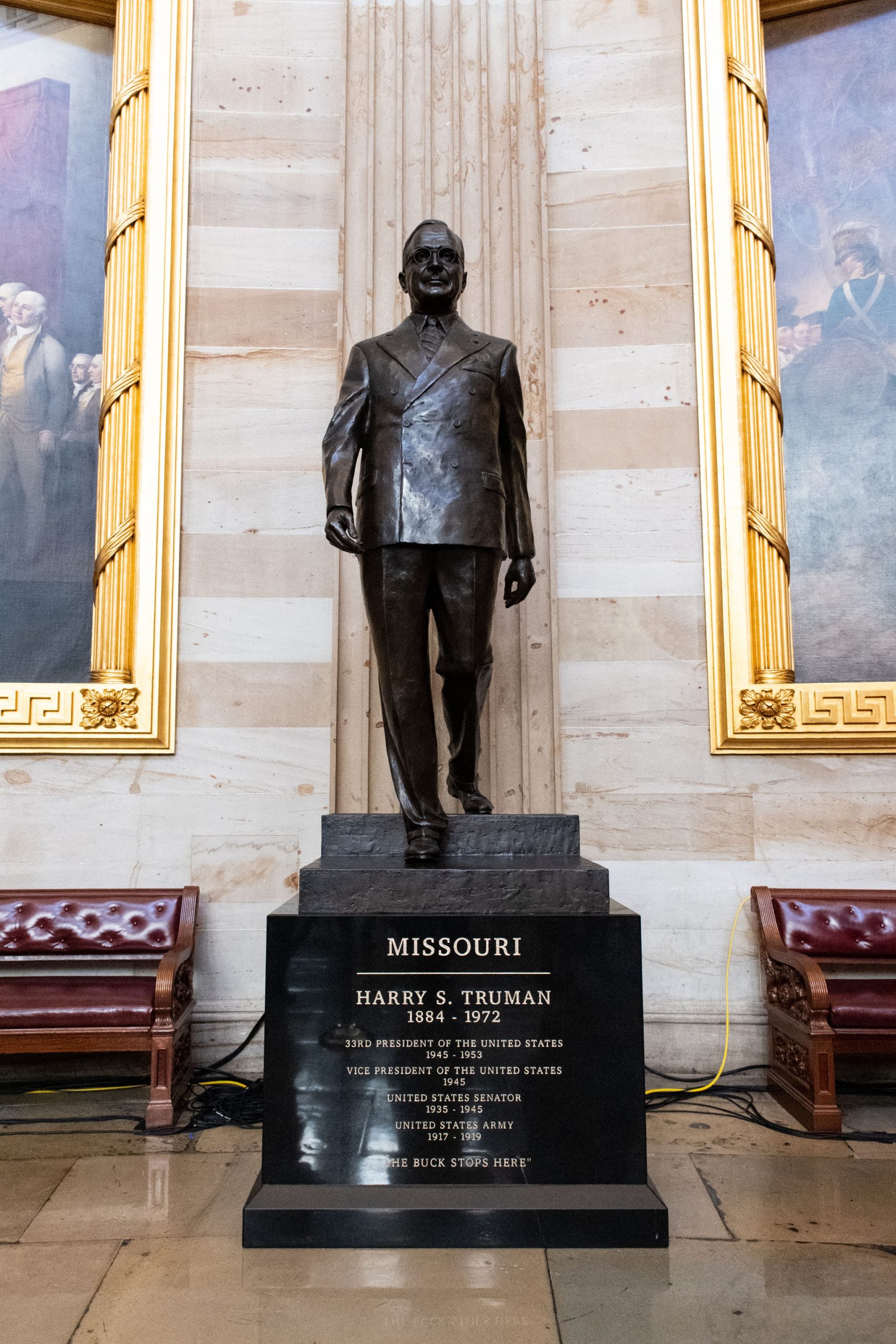
LEARN MORE ABOUT THE TRUMAN STATUE
Photos by Brandon Payne for Karlin Villondo Photography


